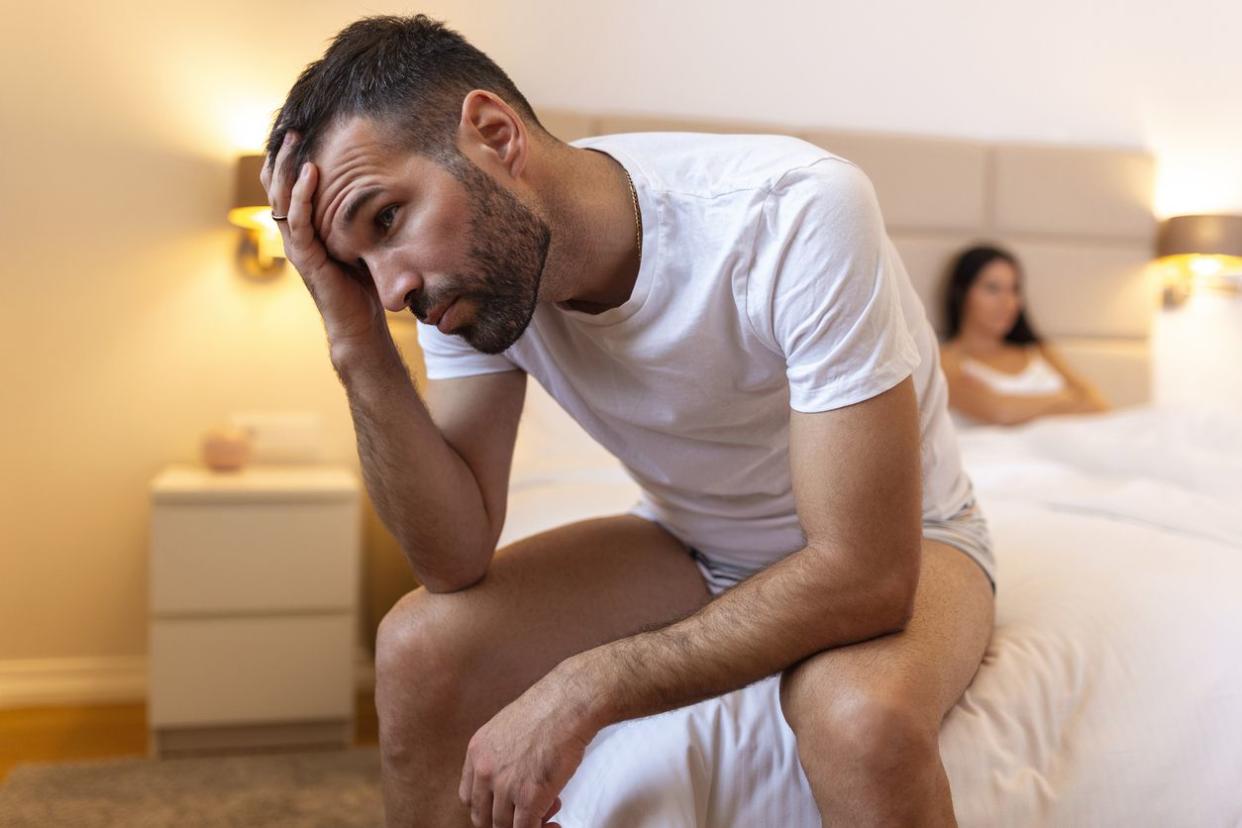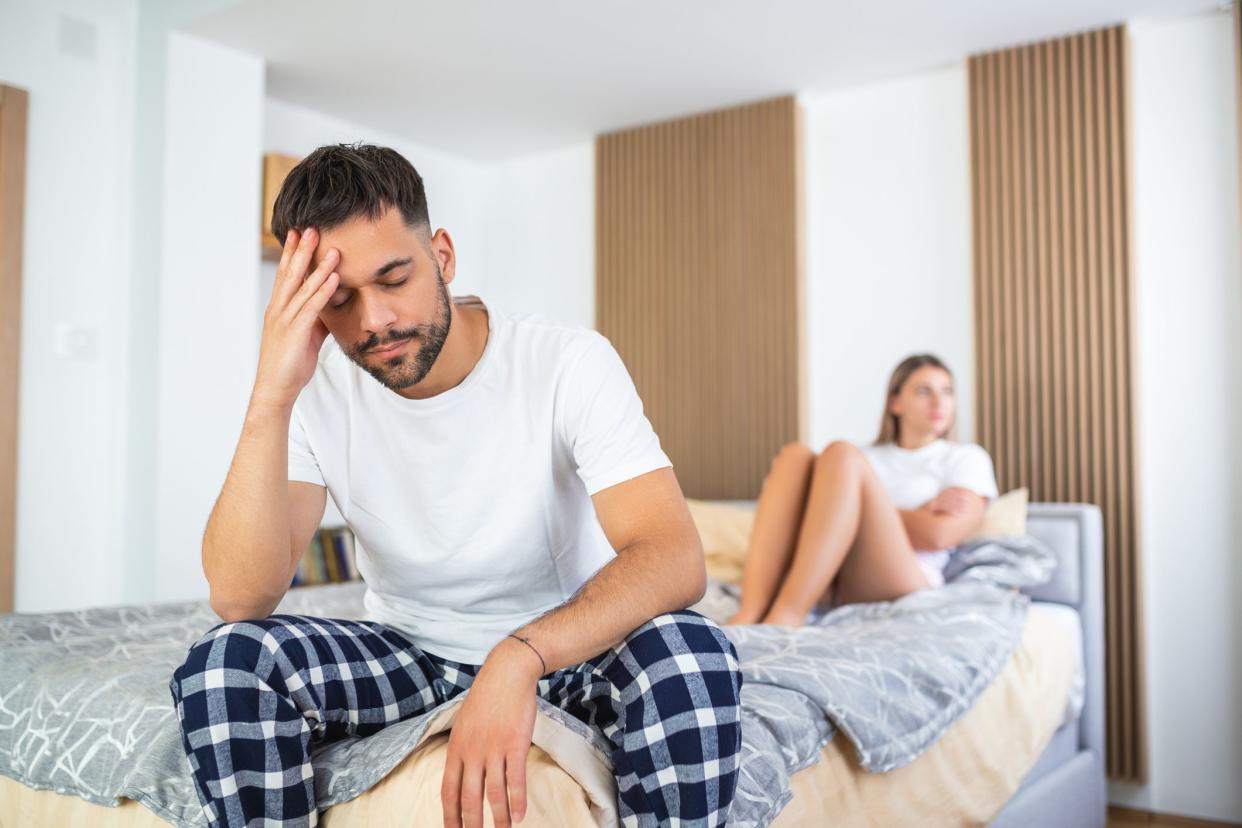Here’s Why You Get Nocturnal Arousals
This article was reviewed by Felix Gussone, MD.
“Stiffness” is often considered a sign of male arousal, but it’s not uncommon to experience it even when you’re not turned on. Nocturnal arousal refers to arousals you develop while sleeping.
These sleep arousals are normal and can even be a sign of good overall circulatory and health, because these nighttime arousals rely on healthy blood flow to the privates. They usually occur during rapid eye movement sleep, which is also the period of sleep where dreaming occurs.
Regularly experiencing nocturnal arousals but experiencing ED during intimate activity can be a clue that the issue may be psychological, as opposed to circulatory or neurological problems. In cases of psychological ED, nocturnal arousals tend to remain unaffected.
Before we get into the useful information that sleep-related arousals might provide about your health, the best place for us to start this conversation is actually at the beginning — why do they happen in the first place?

Why Do People Get Arousals During Sleep?
The medical term for experiencing nighttime arousals is nocturnal tumescence (NPT).
-
nocturnal means at night
-
P refers to your privates
-
tumescence refers to swelling or filling with blood
Nighttime arousals are a normal reaction that can be a sign of good overall and health. It’s normal to experience arousals three to five times per night, although these will go unnoticed while you’re sleeping.
Sleep time arousals are highly associated with rapid eye movement sleep, also called REM sleep.
While you sleep, you cycle through various sleep cycles:
-
non-REM sleep, consisting of:
-
Stage 1: The lightest phase of sleep that usually lasts one to five minutes.
-
Stage 2: A deeper phase of sleep characterized by a drop in heart rate and body temperature that lasts for about 25 minutes
-
Stage 3: The deepest phase of non-REM sleep where the body repairs and regrows tissue.
-
-
REM sleep, the phase of your sleep cycle associated with increases in brain activity, heart rate, and rapid eye movement with closed eyes. Most dreaming occurs in this period.
During a normal night, you usually cycle through four to five sleep cycles that last roughly 90 minutes each.
Arousals that occur during REM sleep aren’t usually related to intimate thoughts, dreams, or stimulation. They’re simply the result of your body cycling through the normal sleep cycles.
Changes during these sleep stages lead to fluctuating levels in neurotransmitter levels, such as decreases in norepinephrine production during REM. Norepinephrine plays a critical role in activating your “fight or flight” sympathetic nervous system.
It’s been theorized that reductions in sympathetic activity and upregulation of parasympathetic “rest and digest” activity allow pro-arousal pathways to take over and facilitate arousals while sleeping.
Having a full bladder may also stimulate nerves that lead to your spinal cord and could potentially trigger a spinal reflex that leads to an arousal.
Some nighttime arousals may be linked to intimate dreams also called wet dreams, which can give you an arousal and possibly even lead to nighttime ejaculation.

Are Sleep Arousals A Sign of Something? | Night Arousals
Night arousals are not a sign that something is medically wrong with you. If anything, they can be a sign of good overall health since they show that your nervous system and circulatory system are functioning as they should.
Most healthy men experience nighttime arousals, even if they never realize that they’re occurring.
In fact, medical professionals often measure changes in blood flow in your privates as a test to differentiate physical causes of ED from psychological ones.
You may receive a test for sleep arousals at home or in a special sleep lab. The test is known as an NPT test, stamp test, or rigidity test. During the procedure, you wear a special device over your privates while you sleep that can measure changes in size and blood flow in your privates. The test is painless and generally needs to be performed multiple nights in a row.
If it’s found that you have normal blood flow to your privates during the night, it likely means that psychological factors are contributing to the development of dysfunction.

The Connection Between Sleep Arousals and ED | Why Do I Wake up Hard?
Not experiencing nighttime arousals might be a sign of problems with your circulatory, neurological, or hormonal health. You may also experience ED when trying to engage in intimate activity or could be at risk of developing ED in the future.
ED is when you’re unable to achieve getting hard firm enough for intimacy. It’s normal to occasionally have trouble maintaining an arousal, especially when drinking alcohol.
Many problems can contribute to ED such as those affecting your:
-
Hormone levels (low testosterone)
-
nerves in your central nervous system and pelvis
-
psychological and psychiatric health
-
blood vessels and heart
Not achieving spontaneous arousals while sleeping and when waking can be a sign that there’s a problem with your nerves or blood vessels. However, it’s worth noting that you may be experiencing these arousals without ever realizing it.
If you’re concerned about your health, it’s a good idea to talk to your primary healthcare provider. They can run tests to help you understand the underlying cause or might refer you to other medical professionals such as an endocrinologist or urologist.

Connection between ED and Sleep Apnea
Sleep apnea is a common sleep disorder where your breathing stops periodically while you’re sleeping. These disruptions to your normal breathing can cause disruptions to blood flow to essential organs.
Research consistently shows that sleep apnea increases the risk of ED, as well as many other conditions.
Multiple factors likely play a role in the connection such as:
-
decreased libido
-
reduced production of a molecule called nitric oxide that allows your blood vessels to relax
-
cellular stress due to low oxygen flow

Other Causes of ED
Many different factors can contribute to the development of ED, which include the following:
-
lifestyle factors such as:
-
smoking
-
consuming too much alcohol
-
using illegal drugs
-
being overweight
-
not exercising enough
-
psychogenic or emotional issues, such as:
-
fear of failure during intimacy
-
depression or anxiety
-
guilt or shame
-
low self-esteem
-
stress
-
medications side effects such as:
-
blood pressure medicines
-
antidepressants
-
sedatives
-
appetite suppressants
-
-
certain medical conditions such as:
-
type 2 diabetes
-
heart and blood vessel disease
-
high blood pressure
-
chronic kidney disease
-
-
multiple sclerosis
-
Peyronie’s disease
-
injury to your privates, spinal cord, prostate, bladder, or pelvis

Sleep-related painful Arousals
Developing painful arousals in your sleep is a rare problem but it does occur in some men. Some men who experience these painful arousals have normal arousals in the daytime without pain.
Sleep-related painful arousals might lead to you waking up repeatedly throughout the night and disrupt your overall sleep quality. The underlying cause and predisposing factors aren’t known.

Have Morning Wood but Still have ED
If you regularly wake up with morning arousals but find you have trouble maintaining an arousal when it comes to engaging in intimate activity you may benefit from speaking with your primary healthcare provider.
If you’re having problems with your genitals, your primary care doctor might refer you to a specialist in the reproductive and urinary system called a urologist.
If they suspect other problems, they may send you to other types of specialists such as a neurologist or endocrinologist.

How to Treat ED Regardless of Sleep Arousals
The best way to treat ED depends on the underlying cause.
The first line of treatment for ED often involves lifestyle modifications such as:
-
improving your diet
-
increasing physical activity
-
quitting smoking
-
reducing alcohol intake
-
taking steps to improve your mental health
If psychological factors such as anxiety, stress, or depression are playing a role, you might benefit from undergoing counseling or therapy, possibly with your partner.
Medications such as phosphodiesterase-5 inhibitors are widely prescribed and effective in improving blood flow to the privates and facilitating arousals. These drugs are taken orally before intimate activity, but they require stimulation to be effective.
Medications approved in the United States include:
-
sildenafil (Viagra)
-
tadalafil (Cialis)
-
vardenafil (Levitra, Staxyn)
-
avanafil (Stendra)
Most of the common side effects of these medications are minimal. One rare but serious complication that requires immediate emergency medical attention is priapism, a prolonged and painful arousal lasting for more than 4 hours.
For men who do not respond to oral medications, other options include:
-
vacuum arousal devices
-
privates injections
-
urethral suppositories
-
hormone replacement therapy, for individuals with low testosterone levels
In severe cases, surgical interventions such as privates implants or surgery are considered. These procedures are typically reserved for cases where other treatments have failed.

Nocturnal Arousals: The Final Word
Getting an arousal (or multiple) while you sleep is perfectly normal and healthy. Not experiencing them at all can suggest problems with your health.
Detecting nocturnal arousals can be challenging since they typically occur during the rapid eye movement (REM) stage of sleep, and you won’t be aware of them happening. One sign of having nighttime arousals can include waking up with a boner, because humans tend to wake up coming right out of REM sleep.
If you’re waking up with arousals in the morning but have trouble maintaining an arousal firm enough for intimacy, it may suggest that the underlying cause is psychological rather than physical.
It’s a good idea to talk to your healthcare provider about your intimate function if you’ve been experiencing intimate problems. Talking to your doctor about your health can be embarrassing but there’s nothing you’ll tell your doctor that they haven’t heard before.
Your doctor can help recommend treatment options and prescribe medications that may help make it easier to achieve an arousal such as sildenafil or tadalafil. They may also refer you to a specialist in urology who can perform further tests to look for problems with your intimate function.
Related: Can ADHD Affect Your Performance in the Bedroom?
Related: Can Pre-Workout Cause Bedroom Issues?
This article originally appeared on Hims.com and was syndicated by MediaFeed.org





